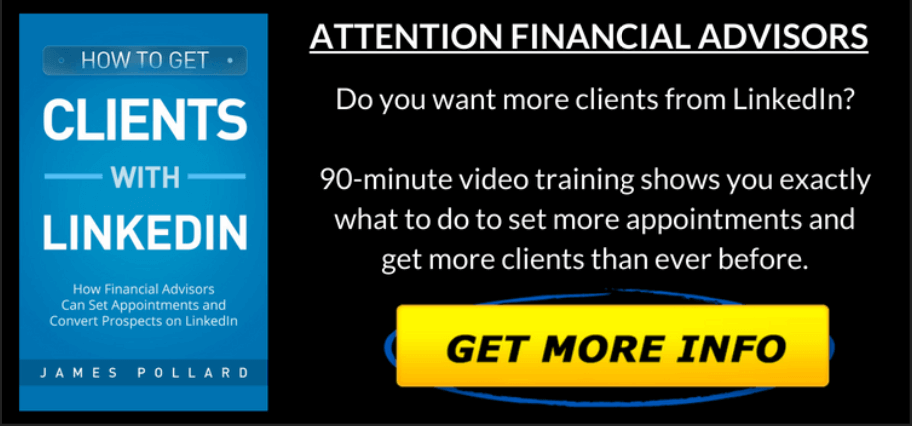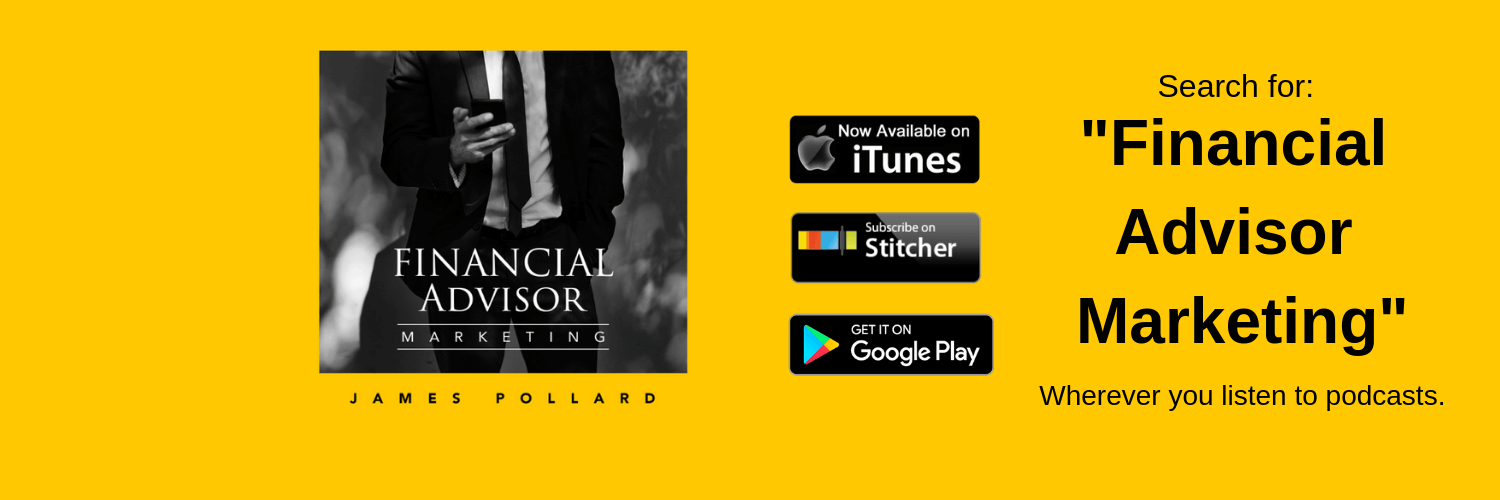10 Things I Wish All Entry Level Financial Advisors Knew
If you’re someone seeking an entry level financial advisor position (or perhaps hiring for one) then I’ve got good news and bad news…
The good news is that there has never been a better time to be a financial advisor. If you’re willing to work hard and stick to a proven strategy, you can build a great life for yourself. The bad news is that there are a few “shocks” some financial advisors encounter when first starting out. Because I’m someone who works exclusively with financial advisors to help them build their businesses, I’ve worked with everyone from experienced advisors to those just starting out. I’ve found that there are ten specific things I wish all entry level financial advisors knew. Need to know something specific? Jump ahead to:
1. Being A Financial Advisor Is Not For Everyone.
If you’re looking for an easy career where you can coast by on the bare minimum, this field is not for you.
Being a financial advisor involves a lot of work, plus it’s heavily weighted toward the beginning of your career — that means you may work 60 to 80 hours per week in the first few years of building your business, but only work 20 to 30 hours per week once you’re experienced. That’s not to say you should slack off later in your career — but in the first two or three years, your focus will be on marketing and building marketing collateral, and you’ll have to set up operating and prospecting systems to maximize your efficiency. This beginning period is critical, because you create a foundation that’ll continue to work for you, whether or not you consistently bring the heat later on. Putting in the hard work to build a solid foundation affords you opportunities to take it easier, but you have to bust your hump first. A lot of newly minted advisors think they’ll read financial papers and pick stocks all day, but the bulk of building a financial advisory business involves prospecting and marketing. Coincidentally, in my experience, one of the biggest reasons for the high turnover rate in this industry is because entry-level advisors don’t expect to do much prospecting and marketing. Ultimately, it comes down to your perceptions and expectations of this career. Money is in your marketing as a financial advisor, so you need the right mindset to see through the challenges of creating a machine that works for your business. After all, you are building a business, right? You have the skills, the services to offer and the desire to help people improve their lives — but you have to get clients in the door first for any of that to matter. And in case you’re not picking up what I’m throwing down, the key is prospecting and marketing! Don’t try to put a square peg in a round hole. If you’ve given it your best shot and you realize this gig isn’t your calling, there’s no shame in that whatsoever. ALSO READ: 15 Prospecting Tips for Financial Advisors 2. Not All Companies Are The Same.
In fact, being a financial advisor can vary wildly depending on the company you choose. Some are strict, while others are more laid back. Some will hold your hand every step of the way, while others will expect you to hit the ground running. Some will micromanage everything you do, while others will let you do your own thing.
If you’re a potential financial advisor, I STRONGLY recommend you do your due diligence on various companies and take your time doing so. Hop on LinkedIn and start reaching out to various advisors on LinkedIn. Find their email addresses online. Tell them that you’re an aspiring financial advisor and you’re interested in joining their company. Ask them to tell you about a day in their life and the pros and cons of their particular company. For example, working at a wirehouse is different than working for an independent RIA. Companies like Edward Jones expect you to knock on doors while a smaller shop may want you to do seminars to get clients. Again, make sure you take your time with this and explore your options. Doing so can save you a lot of headache and heartache down the road. ALSO READ: A Day In The Life of a Financial Advisor 3. The Income Can Vary.One of the most common questions entry level financial advisors ask me is, “How much money can I make?”, and while that’s a valid question, the answer varies quite a bit.
Why? Because some companies offer a base salary while others don’t. Incentive structures can vary and the fees you charge can vary too. However, I will tell you this: according to the United States Bureau of Labor Statistics, the average financial advisor makes slightly more than $90,000 per year. Figuring this is nearly double the average household income in the U.S., this is a respectable income. Yet, this number doesn’t tell the whole story. Because, again, a financial advisor’s career is front-loaded. This means a new financial advisor may make significantly less while an experienced advisor (who has tons of clients and a solid base of recurring income) makes much more. Of course, this doesn’t mean you CAN’T make more money as a new financial advisor. One of the beautiful things about being a financial advisor is that you get out what you put in. Which means if you acquire the right skills and build your book of business, you can make a lot more money than the average. 4. Ignore The Idea Of Your "Natural Market".One of the most damaging things companies keep pushing to new financial advisors is this idea of a “natural market”. They explain how you have a natural market (aka your friends and family) where you can start selling insurance and investment products. Some may even give you a little packet to help you “brainstorm” people.
Don’t do it! The idea of a “natural market” is one of the biggest myths entry level financial advisors struggle with. Read this email I got from a new advisor… I have recently entered the financial services field. I have over 250 people in my natural market with the majority of them being in the $100K income level. However, since I’m only 25 and the major portion of my natural market is under 30 years old, I can’t imagine gathering huge assets from them. Should I approach them with insurance instead of investments? My answer? The idea of a “natural market” is a complete crock. I want you to imagine you’re a doctor and you just opened a practice. Would you look for a “natural market?” No! You’d look for sick people. Let’s try another one… Imagine you went into the roofing business. Would you approach your “natural market” and expect to do business with you. Again… no! You’d look for people who need new roofs. Why in the world would this concept be any different for financial advisors? ALSO READ: 5 Best Niches for Financial Advisors 5. Take Lots Of Practice Tests For Your Exams.
In order to become a financial advisor, you’ll have to pass a few exams first. One of them is the Series 7, which I talk about here.
If you spend any amount of time on financial advisor forums online, you’ll see lots of pre-licensed people freaking out about studying and prepping for their exams. Yes, they can be difficult, but that doesn’t mean you can’t do it. The test now has a pass rate of 71%, whereas it’s been around 65% in the past. In my experience, I’ve seen one of the biggest predictors in passing the exams to be the number of practice tests you take. 6. Choose Your Marketing Strategies Wisely.
Helping financial advisors improve their marketing is my area of expertise - it’s what I do all day long. I’ve found that nearly any marketing strategy can work if you know what you’re doing and keep doing it.
For example, there are some advisors who scream out “seminars don’t work!” even though are many financial advisors out there getting clients with seminars every day. Another example is that a lot of people say, “cold calling is dead”. Yet, I’ve worked with countless financial advisors who have built their business via cold calling. The key is to choose a marketing strategy that suits you and get great at it. If you can’t stand cold calling and dread picking up the phone every day, perhaps cold calling isn’t for you. That’s okay - pick another strategy. In my experience, one of the best marketing strategies for financial advisors is using LinkedIn to set appointments. Being the huge marketing nerd that I am, I often daydream about creating various marketing strategies for financial advisors. One day I thought to myself, “If I could create the PERFECT marketing strategy for financial advisors, what would it look like?” And I figured…
Then I realized… LinkedIn has all those things! ✅ I made LinkedIn work for me with exactly zero dollars and zero cents, so I know it’s cost-effective. ✅ You can access it anytime; day or night. I know financial advisors who, when they can’t fall asleep, send follow-up messages on LinkedIn at 3 a.m. ✅ It tells you what you need to know about your leads and prospects to be in a better position to reach them. You can search for someone, look at their profile and glean personal details that’ll help you stand out from everyone else. ✅ Thousands of possible connections are at the tip of your fingers, and you can reach them all seamlessly. That’s where LinkedIn dominates — it lets you scale like no other marketing method in the world. ✅ Plus, it most certainly builds authority, credibility and trust with your prospects. So, make sure you evaluate several marketing strategies and choose the ones that suit you best. If you’re unsure where to start, check this out: How to Get Clients With LinkedIn. 7. Don't Be Afraid Of Sales.
Remember how I explained that entry-level financial advisors are often shocked to find out there’s a lot of prospecting and marketing involved in this career? Well, the same goes for sales.
The definition of “sell” is “to persuade someone of the merits of [your product or service].” This means a large part of your career as a financial advisor will be spent persuading people to do business with you. And there’s no way around it if you want to succeed. ALSO READ: 7 Reasons Why Most Financial Advisor Sales Training Completely Fails 8. Don't Let Your Inexperience Bother You.
In my years of working with countless financial advisors, I’ve discovered two truths that are often the hardest pills to swallow:
👉 Your credentials don’t matter as much as you think they do. 👉 Your experience doesn’t matter as much as you’d like it to. Do credentials and certifications help? Sure they do. But from what I’ve seen, what’s most important is your market-to-message match — a.k.a. your ability to speak directly to your niche. That’s how newer financial advisors can blow the experienced ones out of the water, and it’s how experienced advisors can skyrocket their results. I know new financial advisors who make more money and more of an impact than people who’ve been in the business for 10 or 20 years, simply because the rookies put proven systems and techniques to use. Look at it this way: Just because someone has been a financial advisor for 10 years doesn’t mean they have 10 years of experience — they could truly have one year of experience repeated 10 times. (Kind of like how some adults are really just two toddlers in a trench coat!) Here’s a great example of why experience doesn’t always win. One of my favorite books is “The Millionaire Fastlane: Crack the Code to Wealth and Live Rich for a Lifetime” by M. J. DeMarco. There, he tells a story about an Egyptian pharaoh who orders his two nephews to build two pyramids as a tribute to Egypt. Nephew 1 got to work ASAP creating his pyramid’s foundation by laying down and setting up formations of bricks. Things were going well until he got to the second layer of the pyramid, where he realized the bricks were too heavy to carry. To solve this problem, Nephew 1 hired a personal trainer to help him build muscle. With more strength, Nephew 1 built the second and third layer, then he hit another roadblock — there was no way he could possibly haul more bricks up even higher layers of the pyramid. Now, while Nephew 1 focused on strength to accomplish his task, Nephew 2 was building a machine that would build the pyramid for him. With no evidence of a pyramid in sight, it appeared Nephew 1 and his foundation were in the lead — but not quite. When he couldn’t get strong enough to manually finish his pyramid, Nephew 1 eventually gave up. Nephew 2, however, completed his machine and easily built his pyramid, all because he’d taken his time in the beginning. 💡 Throughout your career, your experienced peers may judge your process and ask, "Where's your pyramid? You haven't even put the bricks down yet to make a second layer!" Little do they know, you’re creating a machine that’ll pick up your bricks and build the pyramid so you don't have to break your back to do it. The next time a seasoned financial advisor gets on their high horse about all their experience and certifications and the alphabet soup behind their name, keep in mind what author William Thorndike found in his book “The Outsiders: Eight Unconventional CEOs and Their Radically Rational Blueprint for Success.” After profiling some of the best CEOs of all time, Thorndike found that in almost every single case, the best CEOs had no experience in the industry where they became successful. No. Experience. Experience isn’t the meal ticket you think it is, folks — but building your skills and prospecting and marketing definitely is. 9. Ignore Most Of The "Advice" Out There.
There are a lot of experts and gurus out there who promise to give financial advisors some magic silver bullet that’ll help solve all their problems — most of these people are full of crap.
Remember: If it really was that easy, everyone would do it. I make no bones about my products and services; I openly tell financial advisors they won’t work for everyone. I rarely accept anyone as a private client, and I make it clear my Inner Circle newsletter is only meant for a rare group of advisors. Do yourself a favor and ignore other people’s opinions. Most people literally have no idea what they’re talking about. Be very picky about where you get your advice. 10. Choose Your Mentor Wisely.To the surprise of many people, “Why seeking out a mentor is one of the worst things a new financial advisor can do,” is something you’ll see early on in my sales page for Your First Year As A Financial Advisor.
Mentorship is touted as a route you have to take to succeed as a new or even experienced advisor, but I don’t agree. If you want a mentor to guide you, more power to you — but my advice is to be extremely picky when you choose one. Why? Because it’s not the miracle solution most people say it is. In “No B.S. Sales Success in The New Economy,” author Dan Kennedy talks about how “grizzled veterans” — i.e., experienced financial advisors — can contaminate new employees, because they’re not fully aware of their own counterproductive habits. Plus, they might resent new, energized advisors who might make them seem lazy or ineffective. To prove his point, Kennedy referenced a study where a company hired three new salespeople and placed them in the same office as a few grizzled veterans. Although the newbies started off with a bang and saw some success, the veterans’ influence plummeted their results in less than two weeks. The company tried again: They hired three more salespeople, but this time, placed them in their own office environment. Guess what? They did just fine, and everything went smoothly. Choose mentorship if you believe it’ll benefit you and your business — just keep in mind it’s a lot easier for an expert to infect your mind with toxic information when you’re a blank slate. 11. Invest In Yourself.One of the biggest regrets experienced financial advisors share with me is that they wish they invested in themselves more.
🔑 Investing in yourself is one of the keys to succeeding as a financial advisor, because it shortens your learning curve and gives you new ideas to implement in your business. You can either invest time or you can invest money. If you’re an entry-level financial advisor who doesn’t have much money, you’ll have to invest your time. How? Hit the library. Read articles like this one and listen to podcasts like mine, Financial Advisor Marketing. Be frugal with your time and invest it in areas which can give you a positive return. This is critical because, as a financial advisor, your income is closely related to how you spend your time and how productive you are.
When you choose to do one activity (such as watch mindless TV) you are also choosing not to spend time on other activities (such as reading a book about marketing) that could be beneficial for your professional development. And even though most of my products range from $100 - $1,000, I offer Your First Year as a Financial Advisor for only $20. Why? Because I realize that new financial advisors may not have a ton of money to invest in themselves right away. So, I priced it low enough so anyone can afford it. And if you’re a new financial advisor who isn’t willing to invest twenty bucks in yourself… well, maybe you should look for a new career. Because it “costs” less than a tank of gas and significantly less than a dinner and a movie. And I say “costs” because it really shouldn’t cost you anything - it should pay for itself again and again. In other words, make sure you invest both your time AND your money to grow as a financial advisor. If you’re interested, check that out here: Your First Year as a Financial Advisor |




